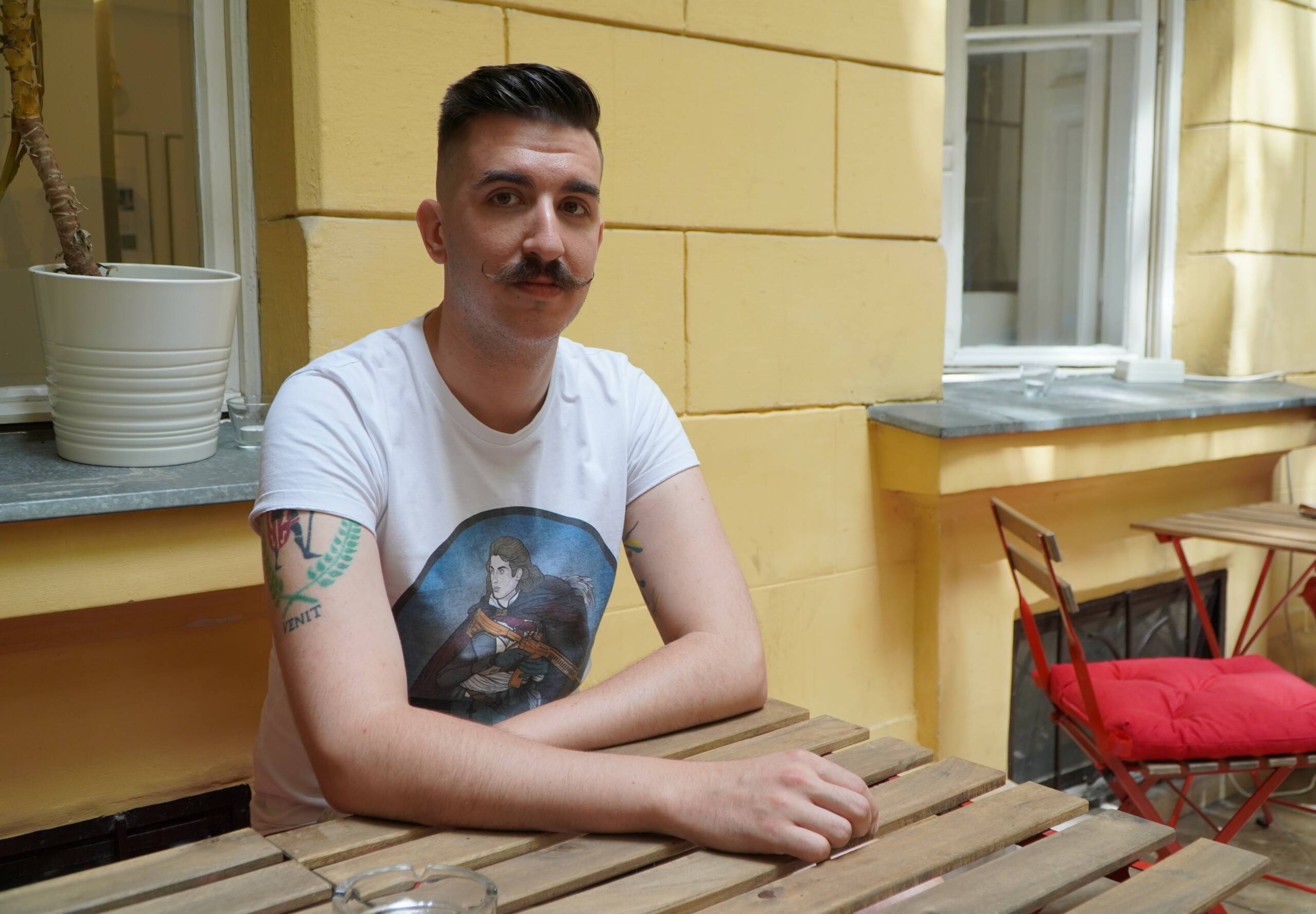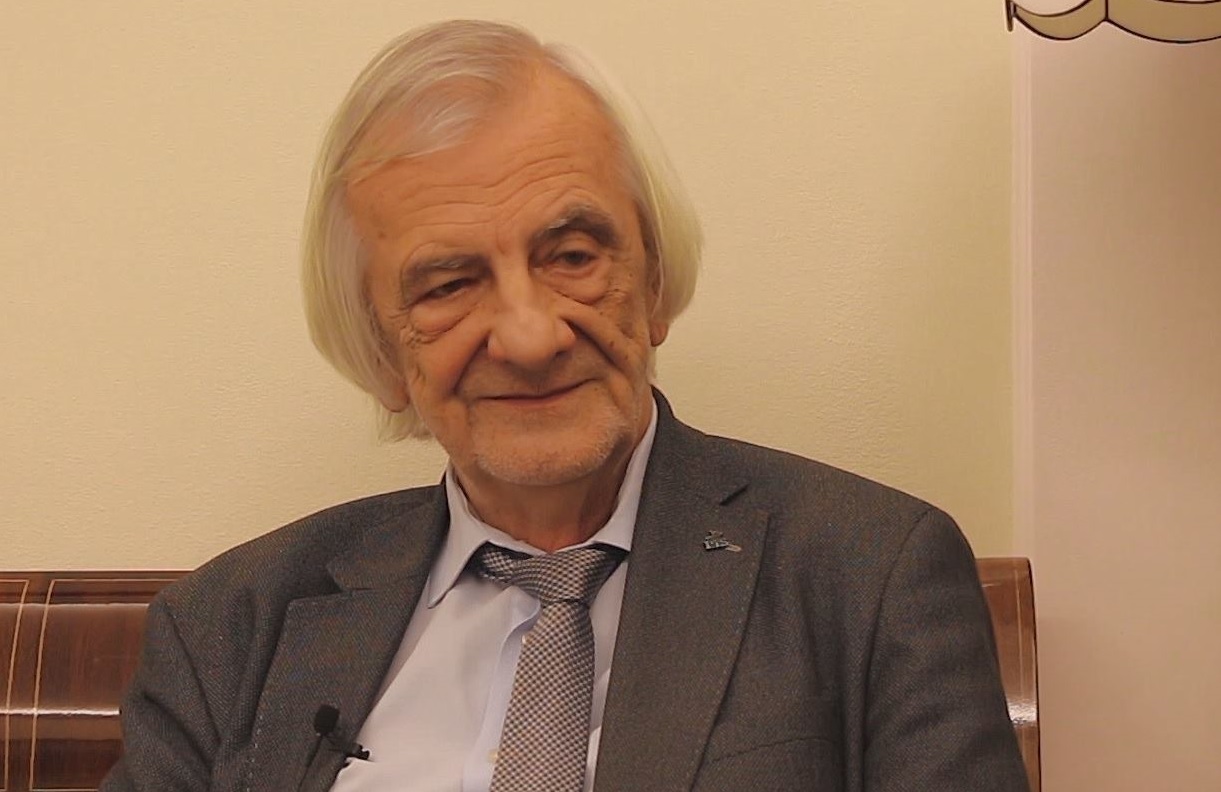Interview with Ábel Bódi, leader of Identitás Generáció (Generation Identity), the Hungarian branch of the French youth movement Génération Identitaire (GI): “the voices that call us far-right – here in Hungary too – are those of people leading and ruining states such as France and Germany”
Well-known in France, where the movement started (the very first organisation was founded in 2003 under the name Bloc Identitaire, Identitarian bloc), the movement of the Identitarians is also present and active in Germany and Austria. Few people know that the organisation also has a branch in Hungary. The Identitarians are mostly youngsters concerned by issues such as immigration, LGBT hegemony and Islamisation of certain parts of Europe. The Identitarians are often attacked by the French, German and Austrian states, and labelled by the liberal and progressive left-wing press as a fascist, extreme right-wing or racist movement.
If the situation – and therefore the actions of GI activists – are similar in France, Germany and Austria, the existence and action of this movement in Hungary raises questions. Why such a movement in a country with no extra-European immigration? What is the purpose of this movement in a country without massive Muslim immigration? What is the raison d’être and what are the actions of the Identitarians in Hungary, the country of conservative Prime Minister Viktor Orbán, who became world famous in 2015 for his opposition to uncontrolled mass immigration?
Ferenc Almássy met the leader of the Hungarian organisation, Ábel Bódi, in Budapest for an exclusive interview.

Ferenc Almássy: The French government announced that they want to ban the Generation Identity movement. Something similar is happening in Austria, where, for the time being, their Lambda symbol is being penalized. It is classified as an extremist organization in Germany; meanwhile, though it exists in Hungary, few know about it. In fact, in Hungarian society it is not seen as an extremist movement at all. How can there be such a difference? And why does this movement exist in Hungary, and why is it so tolerated?
Ábel Bódi: These are very good questions, and the answer covers a fairly wide spectrum. I usually say we do the same thing in every country. We are talking about the same topics and problems everywhere. Later I will talk about why things are a little different in Hungary.
Ferenc Almássy: Are the Generation Identity movements just related, or do they fall under the same umbrella?
Ábel Bódi: Aside from the common symbol and some cooperation, there is no umbrella. If a given country wants to establish their own Generation Identity organisation, they of course need the permission of the other participating countries. The Lambda can’t be used any which way.
Ferenc Almássy: So, the Identitarians don’t have a central leadership?
Ábel Bódi: No. Just picture it this way: we want to see Europe work. In our case, independent movements work together for common goals, we don’t interfere in the domestic political affairs of the nation. We have a solid set of values which we want to encourage for society.
Ferenc Almássy: Is there some kind of charter or something?
Ábel Bódi: No, and this doesn’t really need to be laid out because the right, conservative thoughts mean the same thing everywhere. This can best be seen in the critique of migration and the rejection of the ’68 Cultural Revolution.
This is a perfect example – if we’ve already organically come to this actually healthier conclusion of what we represent – that the West is really headed for a sick direction, as those who consider the Identitarians extremist and Orbán a fascist. From this point, perhaps everyone will see the idiocy of that. The only difference in the West is that the voices that call us far-right – here in Hungary too – are the ones leading and ruining states such as France and Germany.
Ferenc Almássy: But then doesn’t this make it true (according to them) that since you’re not seen as extremists here in Hungary, thus Orbán is an extremist and that’s why he tolerates you?
Ábel Bódi: That’s a good question! Obviously, no. Everyone should see what we have to say. Based on that, if someone considers us extremist, then maybe they should recognize that their objectivity is compromised. That’s the first thing. The other is, that in the West, the silent majority is buying into these lines less and less. Of course, there, the ongoing liberal manufacturing of the consciousness industry has reshaped the population in recent decades and thus people don’t take a position on the conflicts that public discourse still provides opportunities for in Hungary.
We have to take into account that the left-wing press is very strong there. Conservative voices can best operate as “underground propaganda” like here, in the beginning of the 2000s. There, if the average person who doesn’t deal with politics constantly sees that the Identitarians are bad, they are fascist, then, though they don’t really deal with public affairs, they’ve seen our symbol and assume it’s bad – and that’s that. People won’t dive deeper to read and see every side there is to it…
From this point, they can very skilfully narrate the role of a movement at a given political level. This does not happen at home in Hungary, thank God, as I can say that it’s not as easy to convince Hungarians that someone is or isn’t a fascist because we have experienced both gangs [ed.: “both gangs” relating to the fascists and the communists]. And from here, I think that Hungarian society is a little more thoughtful of someone who the West is trashing in such a way. In the West, a political campaign has been launched against the Generation Identity because it’s not in the government’s interest to have a “right-wing NGO” that draws attention to problems that they do not want to talk about – just think of migration.
Let’s also point out that we represent a slightly different thread here in Hungary. Obviously, we also have a strong voice on immigration and Islam. When asked why there is a need for an identical movement at home (since Orbán is here) I would answer: just look at what happened under de Gaulle in ’68 when the new right was formed. That’s when the cultural left and cultural Marxism gained so much ground – we have to take the gloves off today, before it’s too late, as the struggles of the future must be fought today for the youth.
Ferenc Almássy: You often say that Generation Identity is a metapolitical organization. What do you mean by that?
Ábel Bódi: The first and probably most important thing is that everything is based on community. Its construction in fact, transforms us into a phalanx. As family is the basis of society, it has always been a strong part of politics. Actually, this is one of Fidesz’ advantages, that they are so closely knit. The second thing we try to do is come up with narratives that reveal the true nature of the left – like for example when we “besieged” SZFE [ed. A theatre university where a student strike was recently instrumentalised against the Hungarian government]. We take the counter-revolution to the streets; for us, that is the primary front and if there is a curfew, that obviously inhibits us too because we can’t reach people. And social media… well, they aren’t our friends. Going back a bit though, the SZFE affair really highlighted how terrible the cultural war is in Hungary. The government attacked one of the left’s major bastions by seeking to transform the symbol of cultural and educational fusion. Then of course, came the mantra that university independence and freedom is at stake as well as students’ self-determination… We did not look idly by. We ripped the mask off the left and revealed their real intentions: the left’s need to preserve its cultural hegemony.
That’s when we managed our most famous move thus far, and I think we succeeded in providing a narrative. Without any exaggeration I can say that until that point, the right unfortunately did not have an adequate response. Although politicians do have a different margin of manoeuvre and “front line” anyways. Party politics never deals with culture enough – because it can’t really – as it can’t be managed from above, it works much more organically. And this is exactly where our guerilla team can feel at home. Before larger audiences bought into the narrative that it’s about independence, we went there and shed light on the fact that this was really just a disguise.
Ferenc Almássy: Are you Fidesz’ soldiers? Or their partisans?
Ábel Bódi: *Laughs* Not for Fidesz, but for the right. We are the real partisans, at least in terms of operations in enemy territory. I usually say we’re a kind of “special force” activists.
Ferenc Almássy: And what do you think of the Hungarian government? What kind of relationship is there between the Hungarian government and the Identitarians? Do you think it’s possible that it may be banned at some point? Also, you’ve been in the Fidesz-friendly media frequently recently. What can we know about this relationship?
Ábel Bódi: I would rather say that we have a narrative-relationship, some things we agree on and others we disagree on. I don’t believe there is a chance for our organization to be banned in Hungary right now, but obviously “never” can’t be said in politics. I didn’t see Donald Trump going down.
We regularly appear on the Kommentár show, and I write for Magyar Nemzet occasionally and I’m active at Pesti TV too. Thank God I can say that the right-wing Identitarian, new-right message is normal in Hungary. There are many topics that I don’t think Fidesz would have involved themselves with a few years ago. This obviously required a change in the political scene, a silent majority, and a wake-up call. We should be happy if we are attacked from Brussels, or 444 [ed. well known Hungarian far-left online outlet] writes negatively about those of us on the right – if they praise us, we did something very wrong.
Ferenc Almássy: Does the government support you financially?
Ábel Bódi: No, I have a civic occupation as does everyone among the Identitarians. While we study or work, we are activists alongside.
Ferenc Almássy: Where will this all lead? What do you think of the near future for Hungary (if we’ve already strayed from the Identitarian topic), where do you think this conflict with Brussels is headed? We can see that it’s getting stronger as they call for Hungary to be expelled from the EU and or whether our right to vote should be taken away. Do you think this is a good direction?
Ábel Bódi: Let’s start from a little farther back. The European bureaucratic monolith is obviously in need of reform. Currently, the leading politicians in the EU are all ex-revolutionaries, leftists, social democrats, socialists, and I could go on. They’ve got everything, just a shortage of conservatives. So, if these politicians say that Hungary should be sanctioned, we will welcome it, because they are revealing their own true selves because they don’t represent the people of Europe. With these weak leaders who allow internal conflicts, we become a playground for major powers. This was all perfectly exemplified by the European Championships. I’m not a big football fan, but it was very obvious that while the BLM and LGBTQ lobby influence was strong, Arabic and Chinese advertisements were flashing on the sidelines.
What will this all end with? I see that the V4 works very well, Orbán frequently meets with right-wing leaders and he is not avoiding the National Rally either, even though he used to. He has a great relationship with Salvini and it seems to me that the German AfD is moving towards the Hungarian line. Budapest may end up being the opposing polar end of Brussels and that’s why they’re attacking us so aggressively.
Ferenc Almássy: Let’s get back to activism, and specifically what you’ve done. How did the whole movement get started and how did you get there? And what do you do for work as you said you don’t make money through the movement?
Ábel Bódi: No, thank God no. It would be a problem if one served his country for money. At the end of 2017 I took over the leadership of the movement and our first large-scale action was in the gender affairs of the ELTE University when it was still active, and we really were sort of a “special force”. We knew the class would start at 8:15 and the banner rolled out at 7:50 and the flyers were handed out… By the way, I never denied that I was always on the right. Around 2010 I helped Jobbik in Budafok, obviously it was another era, but I wasn’t a member. We are talking about 2009 and 2010, when it was still very different to be a right-wing activist. You put on a Hungarian flag ribbon and you were labelled a neo-Nazi, so it was a very hard time, but it was good, but Jobbik has changed… After the elections I left them because while they promised everything – community life, constant activism – it didn’t happen. They sat in velvet chairs and have been getting along very well, and well, we see what’s become of them.
That’s when I became disillusioned with politics and didn’t even deal with it for a year and a half, and then during college I turned a bit to the extreme right, but I think that happened to a lot of people in our generation – due to a lack of a better alternative. After this turn to the far right, I realized that neither anti-Semitism nor socialism is for me, I can’t identify with it, so I quit in 2015. Obviously, the more one reads, the more one realizes that these two do not necessarily go together. Then I graduated in 2016, avoided public life, got a relatively good job at a multinational company back then, and for a year and a half I left politics again; I always felt I had to do something else. My life kept encountering politics until I saw Defend Europe start at sea, and I joined the movement. Finally, I “came home” and I found something I could identify with both in message and activism. We have been present and growing beautifully for 4 years now, thank God all over the country. I can say that in bigger cities there are 1-2 people who are putting up stickers and posters (because that is the basis of activism) so the Lambda is now in more and more places throughout the country.
Ferenc Almássy: Yet at the same time, you are appearing less and less online.
Ábel Bódi: Well right now, 10 days before this interview, my Instagram profile with 2 000 followers was banned. There was no hateful incitement on my profile, just normal patriotic content, but it was banned for “hate speech and dangerous organization”. You don’t need to think of anything extreme, just pictures of 120 people standing in Identitarian blue t-shirts in France…
Ferenc Almássy: How can you take action against this? How can you function as a metapolitical, youth movement while you are literally being censored online by big tech?
Ábel Bódi: Offline. The tech giants are incapable of circumventing reality. There they cannot censor the banners, they have no way to erase our posters, they cannot destroy us patriots. They cannot censor every sticker. And that’s the most important thing. Our message, if not elsewhere, should at least reach a wider audience there. Then, in turn, comes an alternative. Politics needs to be taken to the streets.



